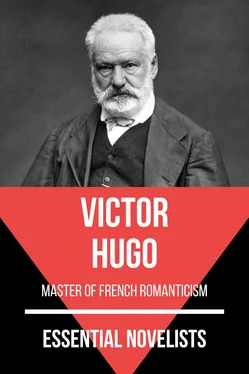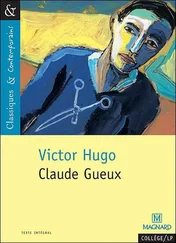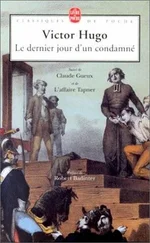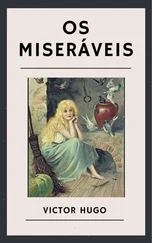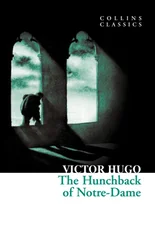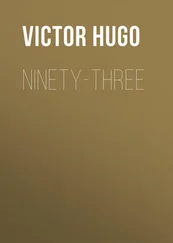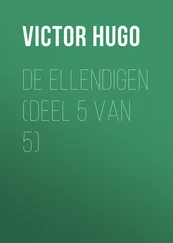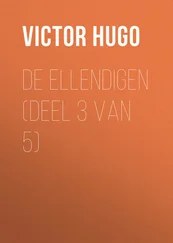This infallible passage of the king at the same hour was, therefore, the daily event of the Boulevard de l’Hôpital.
The promenader in the yellow coat evidently did not belong in the quarter, and probably did not belong in Paris, for he was ignorant as to this detail. When, at two o’clock, the royal carriage, surrounded by a squadron of the body-guard all covered with silver lace, debouched on the boulevard, after having made the turn of the Salpêtrière, he appeared surprised and almost alarmed. There was no one but himself in this cross-lane. He drew up hastily behind the corner of the wall of an enclosure, though this did not prevent M. le Duc de Havré from spying him out.
M. le Duc de Havré, as captain of the guard on duty that day, was seated in the carriage, opposite the king. He said to his Majesty, “Yonder is an evil-looking man.” Members of the police, who were clearing the king’s route, took equal note of him: one of them received an order to follow him. But the man plunged into the deserted little streets of the faubourg, and as twilight was beginning to fall, the agent lost trace of him, as is stated in a report addressed that same evening to M. le Comte d’Anglès, Minister of State, Prefect of Police.
When the man in the yellow coat had thrown the agent off his track, he redoubled his pace, not without turning round many a time to assure himself that he was not being followed. At a quarter-past four, that is to say, when night was fully come, he passed in front of the theatre of the Porte Saint-Martin, where The Two Convicts was being played that day. This poster, illuminated by the theatre lanterns, struck him; for, although he was walking rapidly, he halted to read it. An instant later he was in the blind alley of La Planchette, and he entered the Plat d’Etain [the Pewter Platter], where the office of the coach for Lagny was then situated. This coach set out at half-past four. The horses were harnessed, and the travellers, summoned by the coachman, were hastily climbing the lofty iron ladder of the vehicle.
The man inquired:—
“Have you a place?”
“Only one—beside me on the box,” said the coachman.
“I will take it.”
“Climb up.”
Nevertheless, before setting out, the coachman cast a glance at the traveller’s shabby dress, at the diminutive size of his bundle, and made him pay his fare.
“Are you going as far as Lagny?” demanded the coachman.
“Yes,” said the man.
The traveller paid to Lagny.
They started. When they had passed the barrier, the coachman tried to enter into conversation, but the traveller only replied in monosyllables. The coachman took to whistling and swearing at his horses.
The coachman wrapped himself up in his cloak. It was cold. The man did not appear to be thinking of that. Thus they passed Gournay and Neuilly-sur-Marne.
Towards six o’clock in the evening they reached Chelles. The coachman drew up in front of the carters’ inn installed in the ancient buildings of the Royal Abbey, to give his horses a breathing spell.
“I get down here,” said the man.
He took his bundle and his cudgel and jumped down from the vehicle.
An instant later he had disappeared.
He did not enter the inn.
When the coach set out for Lagny a few minutes later, it did not encounter him in the principal street of Chelles.
The coachman turned to the inside travellers.
“There,” said he, “is a man who does not belong here, for I do not know him. He had not the air of owning a sou, but he does not consider money; he pays to Lagny, and he goes only as far as Chelles. It is night; all the houses are shut; he does not enter the inn, and he is not to be found. So he has dived through the earth.”
The man had not plunged into the earth, but he had gone with great strides through the dark, down the principal street of Chelles, then he had turned to the right before reaching the church, into the crossroad leading to Montfermeil, like a person who was acquainted with the country and had been there before.
He followed this road rapidly. At the spot where it is intersected by the ancient tree-bordered road which runs from Gagny to Lagny, he heard people coming. He concealed himself precipitately in a ditch, and there waited until the passers-by were at a distance. The precaution was nearly superfluous, however; for, as we have already said, it was a very dark December night. Not more than two or three stars were visible in the sky.
It is at this point that the ascent of the hill begins. The man did not return to the road to Montfermeil; he struck across the fields to the right, and entered the forest with long strides.
Once in the forest he slackened his pace, and began a careful examination of all the trees, advancing, step by step, as though seeking and following a mysterious road known to himself alone. There came a moment when he appeared to lose himself, and he paused in indecision. At last he arrived, by dint of feeling his way inch by inch, at a clearing where there was a great heap of whitish stones. He stepped up briskly to these stones, and examined them attentively through the mists of night, as though he were passing them in review. A large tree, covered with those excrescences which are the warts of vegetation, stood a few paces distant from the pile of stones. He went up to this tree and passed his hand over the bark of the trunk, as though seeking to recognize and count all the warts.
Opposite this tree, which was an ash, there was a chestnut-tree, suffering from a peeling of the bark, to which a band of zinc had been nailed by way of dressing. He raised himself on tiptoe and touched this band of zinc.
Then he trod about for awhile on the ground comprised in the space between the tree and the heap of stones, like a person who is trying to assure himself that the soil has not recently been disturbed.
That done, he took his bearings, and resumed his march through the forest.
It was the man who had just met Cosette.
As he walked through the thicket in the direction of Montfermeil, he had espied that tiny shadow moving with a groan, depositing a burden on the ground, then taking it up and setting out again. He drew near, and perceived that it was a very young child, laden with an enormous bucket of water. Then he approached the child, and silently grasped the handle of the bucket.
Chapter VII
Cosette Side By Side With The Stranger In The Dark
––––––––

COSETTE, AS WE HAVE said, was not frightened.
The man accosted her. He spoke in a voice that was grave and almost bass.
“My child, what you are carrying is very heavy for you.”
Cosette raised her head and replied:—
“Yes, sir.”
“Give it to me,” said the man; “I will carry it for you.”
Cosette let go of the bucket-handle. The man walked along beside her.
“It really is very heavy,” he muttered between his teeth. Then he added:—
“How old are you, little one?”
“Eight, sir.”
“And have you come from far like this?”
“From the spring in the forest.”
“Are you going far?”
“A good quarter of an hour’s walk from here.”
The man said nothing for a moment; then he remarked abruptly:—
“So you have no mother.”
“I don’t know,” answered the child.
Before the man had time to speak again, she added:—
“I don’t think so. Other people have mothers. I have none.”
And after a silence she went on:—
“I think that I never had any.”
The man halted; he set the bucket on the ground, bent down and placed both hands on the child’s shoulders, making an effort to look at her and to see her face in the dark.
Читать дальше
